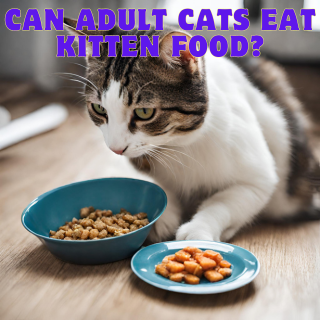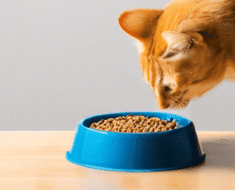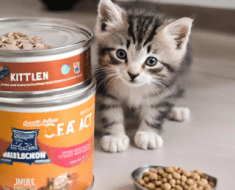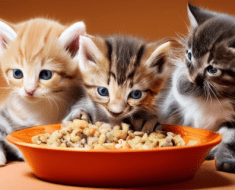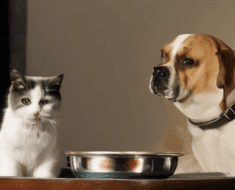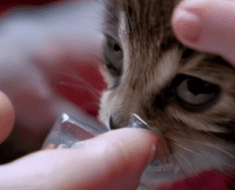Adult cats should not eat kitten food regularly due to different nutritional needs. Kitten food is higher in protein and calories suitable for growing kittens.
However, it may lead to obesity in adult cats if consumed long-term. As cats age, their dietary requirements change to maintain their health and weight. Senior cats, in particular, should not be fed kitten food as it lacks essential nutrients tailored for their aging bodies.
Ensuring that adult cats receive a balanced diet appropriate for their age and activity level is crucial for their overall well-being. While occasional consumption of kitten food may not be harmful, it should not replace a proper adult cat diet. Consulting with a veterinarian is recommended for personalized nutrition advice for adult cats.
The Difference In Nutritional Needs
| Adult Cats | Kitten Food |
| Need a diet rich in proteins and healthy fats | Require high protein and fat content for growth |
| Low in carbohydrates as they are obligate carnivores | Higher carbs to sustain high energy levels |
Cats need a balanced diet, mainly proteins and fats. On the other hand, kittens require higher protein and fat levels for their growth and development. Adult cats have lower carbohydrate needs due to their carnivorous nature, while kitten food has higher carb content to support their energy requirements.
Potential Risks Of Feeding Adult Cats Kitten Food
Feeding adult cats kitten food can lead to potential health risks such as obesity and nutrient imbalance. While kitten food is rich in calories and nutrients essential for growth, excessive consumption can be detrimental to adult cats’ health. It’s important to provide adult cats with a balanced diet tailored to their specific nutritional needs.
| Weight Gain: Feeding adult cats kitten food may lead to excessive weight gain. |
| Nutritional Imbalance: Kittens have different dietary needs than adult cats, resulting in nutritional deficiencies. |
Special Considerations For Senior Cats
As cats age, their nutritional needs change. It’s essential to address these changes for their well-being. The aging process brings about adjustments in energy levels and metabolism. Health concerns such as arthritis, dental issues, and kidney problems become more common. Senior cats may require specific nutrients to support joint health and immune function. It’s important to consult with a veterinarian to ensure the right diet for your senior cat. Ensuring a balanced diet, maintaining a healthy weight, and regular check-ups are crucial for your aging feline friend.
Tips For Proper Feeding
A balanced diet is crucial for adult cats to maintain optimal health and well-being. When it comes to feeding your cat, portion control is essential. Too much food can lead to obesity, while insufficient food intake can result in nutritional deficiencies. Ensure you follow the feeding guidelines provided by the manufacturer to determine the appropriate portion size for your cat.
Additionally, it is important to understand that adult cats have different nutritional needs compared to kittens. While adult cats can eat kitten food occasionally, it should not be their primary source of nutrition. Kitten food is specially formulated to meet the high energy and growth requirements of kittens and may not provide adult cats with the necessary nutrients.
Consult with your veterinarian to determine the best diet for your adult cat. They can provide recommendations based on your cat’s age, weight, activity level, and overall health. Introduce any dietary changes gradually to prevent digestive upset. Remember to monitor your cat’s weight regularly and make adjustments to the portion size as needed.
Conclusion And Recommendations
Feeding adult cats with kitten food can be detrimental to their health and well-being. Kitten food is formulated specifically for the nutritional needs of growing kittens, including higher levels of protein and fat. Adult cats, on the other hand, require a different balance of nutrients to maintain their optimal health.
When feeding an adult cat, it is generally recommended to provide them with a complete and balanced adult cat food that meets their specific nutrient requirements. This ensures that they receive all the necessary vitamins, minerals, and essential nutrients to support their overall health. Consulting a vet can help you determine the best diet for your adult cat based on their individual needs and any specific health concerns they may have.
While it may be tempting to feed adult cats kitten food, it is important to remember that their dietary needs differ. Feeding them kitten food may lead to imbalances and potential health problems in the long run. It is always best to follow the recommendations of a veterinarian and choose a high-quality adult cat food that will support their overall health and well-being.
Frequently Asked Questions On Can Adult Cats Eat Kitten Food
Can My Older Cat Eat Kitten Food?
Yes, older cats should not eat kitten food as it lacks the essential nutrients they need.
What Is The Difference Between Kitten And Adult Cat Food?
Kitten food has higher protein for growth, while adult cat food is for maintenance needs.
How Long Should Cats Eat Kitten Food?
Cats should eat kitten food until they’re around one year old. This food provides essential nutrients for their growth. After that, transition to adult cat food gradually to meet their mature needs. Always consult your vet for the best feeding plan for your cat.
Is There A Cat Food For Both Kittens And Adults?
Yes, there are cat foods available that cater to both kittens and adult cats. These foods provide the necessary nutrients for growth and support the health of cats at different life stages. It is important to choose a high-quality brand with balanced nutrition for both age groups.
Can Adult Cats Eat Kitten Food?
Yes, adult cats can eat kitten food occasionally but not as a primary diet. Kitten food has higher protein and fat content which is not suitable for adult cats in the long run.
Conclusion
Adult cats can eat kitten food in moderation, but it should not be their main diet. Kitten food is higher in nutrients and calories, which may lead to weight gain in adult cats. It’s important to consult with a veterinarian to ensure that your cat’s nutritional needs are met.
Additionally, gradual transitions to adult cat food can help prevent any potential health issues.
